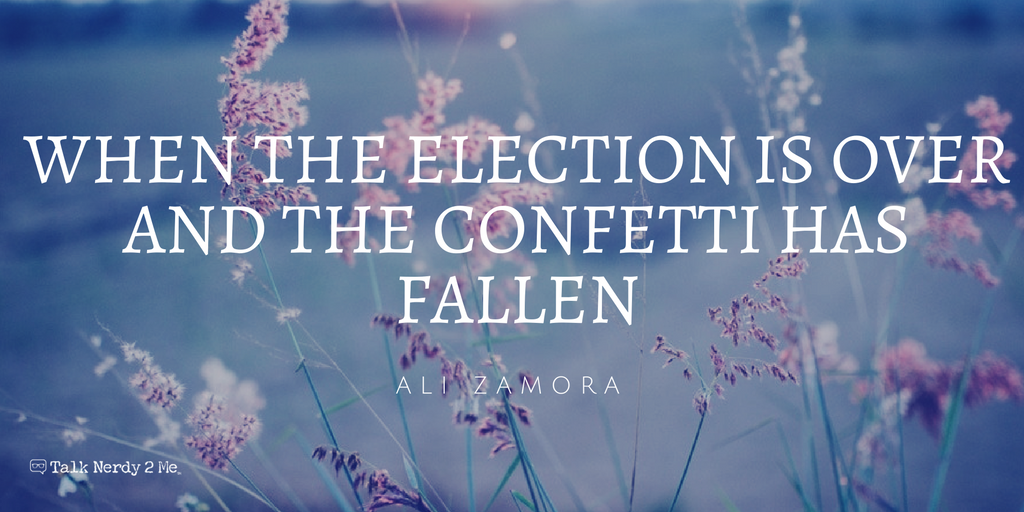We, as a people, accept that in many aspects of life there must be a winner and a loser. It is one of the most understood parts of any sort of competition. From the sidelines, we encourage those who participate with cheers, signs and, in an election, votes – whether it’s for the Golden State Warriors (who lost in the finals), the Chicago Cubs (who won the World Series), or a young kid who wants to be class VP for Mrs. Morgan’s 4th period English class. We will choose a side and celebrate, or we will choose a side and sob. Sometimes, we even help those who fell short, because that is who we are or have been; we provide sweet words of encouragement like “better luck next year,” “you almost had it,” “good game.”
This election season, it’s different. So many of us (myself included) wish we could go about our civic duty, shake hands, swap jerseys, and go to our respective locker rooms to either celebrate or drown our sorrows with orange slices or hot pizza. Despite our best wishes, our best efforts, and some of the best-held traditions of this nation, we have become divided – or perhaps we have allowed ourselves to be divided. And this sense of division has permeated both sides of the aisle; we turn on our televisions, tune our radios, or scroll through our social media apps and see the name-calling, mud-slinging, and finger-pointing.
But we forget there is another reality outside of the political sphere. That reality is the one you see in your everyday life, whether stuck in traffic thinking about the rent increase notice you received last week, or onboard public transportation as you grasp the farecard charged with the last $5 you had in your pocket. It is the same inescapable reality that the person in the SUV next to you may be facing; it is the same feeling that the woman to whom you just gave your seat on the bus or train is also experiencing. Whether we accept it or not, we are facing the same challenges and indignities of life.
This Election Day, I was a witness to that reality. My polling place was full (with even more and more people arriving), and in all those different faces speaking many different languages, I saw the same apprehension and the same worry, the same anxiety, fear, concern, and, most of all, hope that I also held with me.
And it wasn’t just those emotions, palpable and filling the air with a noticeable tension, being shared; we were all – whether voting for the first time or after years of experience – sharing the same ineffectiveness of our system and society: “The pen ran out of ink; I can’t mark my ballot!” “My name’s not on the list!” “I forgot my sample ballot!” “My grandmother needs help in Farsi!” “Crap, I left my sample ballot in the car!”
As it usually happens, there was discomfort, there was annoyance, and finally, because we are all members of the same species, there was respect: “Sir, that young lady over there needs a new pen for her ballot,” someone alerted the first available poll worker. “Ma’am, you want to go ahead to the Orange table and see if they can find your name or give you a provisional ballot?” offered an older gentleman. “Sir, that lady over there speaks Farsi, she can help your grandma,” a young woman announced. Or simply, “It’s ok man, go get your ballot, I’ll save your spot.”
Most in attendance in that cramped church hall-turned-polling place decided to turn to their neighbors and help one another. The reality was clear: we were all in the same situation and we were all dealing with the same shortcomings, despite the best efforts of the poll workers – so it was up to us to alleviate the burden. Regardless of the reasons that drove us there, regardless of our party affiliation or lack thereof, regardless of which candidate we were voting for – because, after all, the vote is secret – in that brief instance, we all helped each other pull ahead.
That is what we should ultimately take away from all that has occurred. Now that we have an elected winner, it is not for someone else to tell us how and when we begin to act as Americans; it is not for someone else to tell us when it is that we unite in concession or in victory. That burden – one of the burdens of democracy – falls squarely on us, the pluribus within that famous e pluribus unum.
We, as citizens of a democracy, as Americans, as humans, are the ones who must show that we DO embody the ideal of democratic values: of participation in an election, and, just as important, in the transition of powers. We don’t stop being neighbors; we don’t stop sharing the same land and the same humanity within us. Not when a team of our liking loses and not when an election is over. Those are the times when unity is needed, when healing and conciliation are the order of the day.
Because who would we be, as a people, if we abandoned those values?
 Ali Zamora is the Online Liaison for the NSCS National Leadership Council. He’s a student at Arizona State University. The NLC can be found on Twitter at @NSCS_NLC and on Facebook atwww.facebook.com/the.nscs.nlc.
Ali Zamora is the Online Liaison for the NSCS National Leadership Council. He’s a student at Arizona State University. The NLC can be found on Twitter at @NSCS_NLC and on Facebook atwww.facebook.com/the.nscs.nlc.

